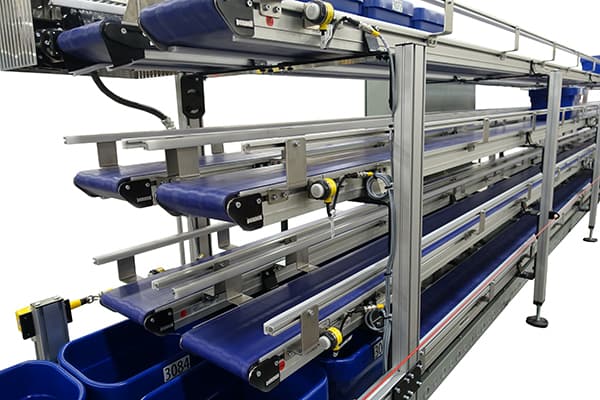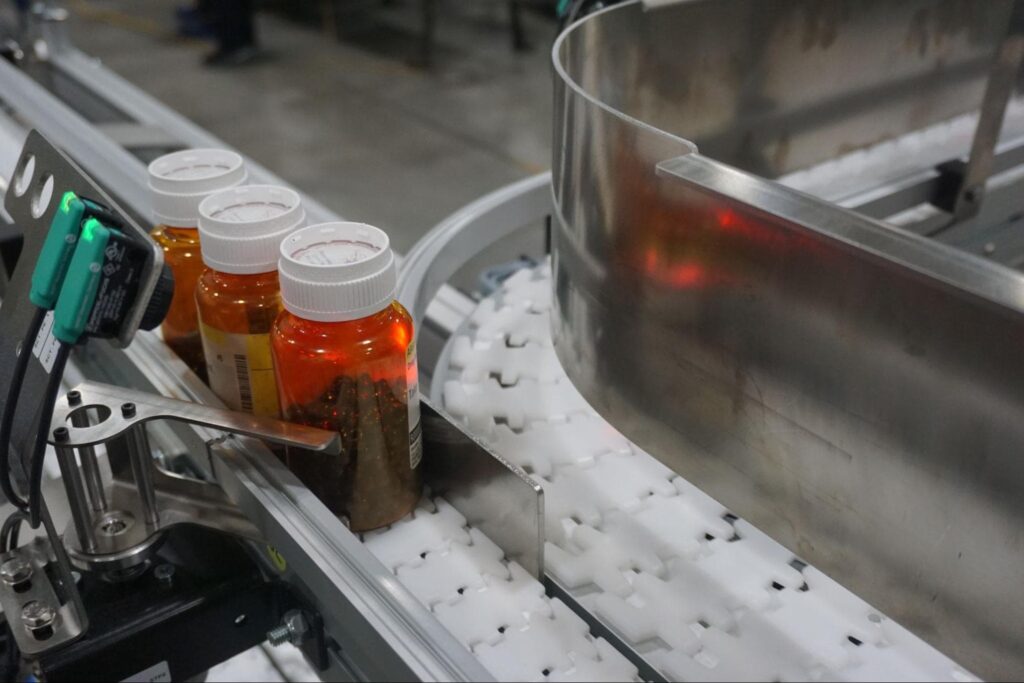
Responsible for supplying essential medications when patients need them, the pharmaceutical industry is increasingly susceptible to challenges that affect the supply chain, from labor shortages to regulation compliance. These challenges can impact the accessibility of prescription and OTC medications, ultimately affecting patient care.
By integrating automation in the form of conveyors, pharmaceutical companies can address and alleviate many of these issues during production, packaging, and distribution. Dorner is here to help you streamline your prescription handling processes and reduce friction and delays in the pharmaceutical supply chain.
Challenges Impacting the Pharmaceutical Supply Chain and How Automation Can Help
The pharmacy supply chain is a complex network that involves drug manufacturers, wholesalers, pharmacies, and healthcare providers. This complexity is compounded by the stringent regulations and quality standards that govern the industry.
Issues can arise at various stages of the pharma supply chain, affecting the availability and timely delivery of medications to medical facilities, pharmacies, and patients. Common challenges include the following:
Labor Shortages and Increased Demand
The demand for prescription medications continues to rise, driven by an aging population and the need for more personalized treatments. However, attracting and retaining enough skilled workers to meet this demand has been a persistent challenge.
Labor shortages can lead to bottlenecks in production and distribution processes, causing delays and inefficiencies in the supply chain. Automation can help reduce dependence on manual labor, allowing pharmaceutical companies to focus on higher-value tasks and ultimately improving patient care.
Regulatory Compliance and Quality Control
Strict regulatory requirements and quality control standards are integral to the pharmaceutical industry. Medications must undergo rigorous testing and adhere to Good Manufacturing Practices (GMP) to ensure their safety, efficacy, and quality.
Human error, such as incorrect labeling or packaging, can compromise patient safety and result in costly product recalls. Automating processes such as labeling and inspection can enhance accuracy, efficiency, and consistency, minimizing the risk of errors and ensuring compliance.
Inventory Management
Balancing supply and demand can be a challenge for pharmaceutical companies, resulting in stockouts or excess inventory, both of which can be disruptive and costly.
Integrating automated systems can improve production efficiency and accuracy, reducing delivery times and minimizing the risk of stockouts and delays. By leveraging predictive analytics, companies can anticipate customer needs and optimize their inventory levels accordingly.
Integrate Automated Conveyor Systems to Enhance Your Prescription Handling Processes in the Supply Chain
With automated conveyor systems, your facility can streamline prescription medication handling and increase efficiency across processes like packaging and inspection. Uphold the highest standards of safety, efficiency, and accuracy by adopting automated conveyor systems into your existing facility.
Mitigate Labor Concerns
Automated conveyor systems can help reduce labor costs by reallocating labor-intensive tasks such as sorting and labeling. Automating these processes allows pharmaceutical companies to focus on higher-value tasks, such as product development and customer service.
Increase Efficiency and Productivity
With conveyors, medications can be transported from one area in production to another efficiently, minimizing bottlenecks and optimizing workflow within your facility. Conveyors can allow you to increase production in ways that wouldn’t be possible with traditionally manual processes and ongoing labor shortages.
Enhance Accuracy
Manual production processes are prone to human error, which can lead to medication mix-ups, incorrect labeling, or packaging errors. Automating these processes with custom conveyor systems from Dorner allows you to improve the accuracy of your processes, such as sortation, labeling, and inspection.
Improve Traceability and Compliance
Automated conveyors can be used to move medications from one station to another, ensuring that they are labeled correctly, packaged securely, and compliant with quality standards.
Conveyor systems equipped with advanced technology, such as barcode scanners and sensors, can ensure accurate tracking, sorting, and verification of medications. These systems can be seamlessly integrated with existing quality control processes, allowing for real-time monitoring and inspection to maintain high standards of quality throughout the production line.
Traceability is essential in the pharmaceutical industry to ensure product safety and regulatory compliance. In the event of a product recall, enhanced traceability can expedite the identification and retrieval of affected medications, minimizing the impact on patient safety and reducing costs.
Automated Solutions for Pharmaceutical Supply Chain Management from Dorner
With a focus on automation and customization, Dorner conveyor systems offer a range of benefits for pharmaceutical companies seeking to optimize their supply chain operations. When you integrate a custom Dorner conveyor system into your facility, you’ll see improvements in:
- Flexibility
- Accuracy and Efficiency
- Productivity
- Quality Assurance
- Compliance and Traceability
- Worker Safety and Ergonomics
The flexibility of Dorner’s custom conveyor systems allows pharmaceutical companies to adapt to changing market demands and optimize their production capabilities. We recommend the following conveyors for your pharmaceutical handling needs:

2200 Series Conveyors
These low-maintenance, high-performance conveyors are designed for efficient small parts handling, precise part movement and positioning, and packaging applications, making them well-suited for medication production. Available with modular, belted, and Precision Move belt technology, the 2200 series is custom-built and configured to meet your needs.

FlexMove Series Conveyors
The FlexMove conveyor series allows for seamless integration into your existing processes. Customizable and designed to navigate tight spaces, elevation changes, long lengths, and more, the FlexMove series can enhance your facility’s efficiency and production output while making the most of your available space.
Improve Your Role in the Pharma Supply Chain With Custom Conveyor Systems From Dorner
Dorner conveyor systems provide the pharmaceutical industry with flexible, accurate, and traceable conveyance solutions for prescription handling processes.
By integrating conveyor systems into your operations, your pharmaceutical company can optimize your supply chain, streamline production and distribution processes, and ultimately improve patient care.
Contact us today to discuss your specific needs and requirements so that we can help design a custom system that works for you.





